“To
have a voice,” L.L, Barkat writes in Rumors
of Water: Thoughts on Creativity and Writing, “a writer must have
passions and a sense of place.”
I
think of Wendell Berry, with his passion for a kind of neo-agrarianism and his
region of Kentucky. I think of William Faulkner and his passion for a way of
life that had disappeared in his native Mississippi. I think of Charles Dickens
in Victorian Britain and all of the passions that coursed through his novels
(mostly centering in questions of social justice).
But
for a long time, I wondered if I indeed had a writing voice of my own.
From
about 1975 to 2006, speechwriting was a significant part of my career. In those
three decades, I wrote for 12 CEOs, numerous other corporate executives, people
running for office, a school board president and a few non-profit executives as
well.
To
write a speech for someone else, and to do it well, you have to essentially
assume their voice – both their speaking voice and their “personal” voice. Over
time, I learned to “channel the speaker” and write in their voice – their stories,
their ideas, their hopes, their favorite quotes and authors, their speaking
patterns and their idiosyncrasies. I read what they read, I listened to their
taped speeches, I watched their videos. I talked with them and listened to them
in meetings and conversations.
Most
PR people hate speechwriting, and with good reason, Speechwriting is never
about you.
The
best speeches I wrote sounded exactly like the executive who was speaking. My
own desires, messages, thoughts and hopes tended to be suppressed. The time to
articulate them was in conversations with the executive about the speech. If he
or she liked them, they became the executive’s.
When
I stopped writing speeches for others about five years ago to do other things, The
thought was in my mind that my voice might be permanently locked up. It was
probably no coincidence that I started doing a lot more writing for myself –
the series of novel manuscripts, one of which became Dancing Priest; this blog (now three years old and counting);
writing for The High Calling, The Master’s Artist and TweetSpeak Poetry; guest posts
and articles; and speeches and presentations for myself.
It
turns out my voice had only been on the back burner, but it had been there all
along. It has been wrapped together with my passions and my sense of place.
I’ll
have more about that on Thursday.
Over
at TweetSpeak Poetry, Lyla
Lindquist is leading a discussion of L.L. Barkat’s Rumors of Water. She’ll be posting on the five short chapters
comprising the section on “Voice” on Wednesday.

Wendell Berry is a wonderful example of voice. I will be watching for these blogs. Sometimes I just need to clear my voice.
ReplyDeleteWhen you use the phrase "assume their voice" it makes me wonder if that is what preacher's do...assume God's voice? Just thinking out loud. Any thoughts?
ReplyDeleteBill - I think of preachers as the vessels God pours through. Would that be the same or a similar thing?
ReplyDeleteTiming is important. You allowed your voice to rise at the right moment. . . when it could be heard as yours alone.
ReplyDeleteLearning to speak as someone else. Your post raises fascinating and challenging issues.
ReplyDeleteOh sir Glynn, your voice is grande terrifical!
ReplyDeleteAnd this piece coincides nicely with your interview over at my place today (yes, unabashed advertising so folks can learn more from a great writer like yourself).
Blessings.
http://simplydarlene.com/?p=1717
I think it would be the same Glynn. I am "assuming" to speak for God. I am His voice, His vessel, to use your words.
ReplyDeleteI'm glad you found your voice. It looks just right on you.
ReplyDeleteDo you think that your own voice has evolved, Glynn, even after you found it? I'm curious to hear your thoughts on that.
I look back at my news stories, which had a definite voice to them. (Yes, we can even have voice in journalism...) But my voice has changed somewhat since then, though I think my writing is still rooted in a journalistic voice. I look back four or five years ago, and see that new notes were being woven into the song. Maybe my voice is a chorus -- or at least a four-part harmony. In any case, I sure hope that it's in tune! :)
Think my mute button is stuck in the on position.
ReplyDeleteSusan, it's not the mute button you have. It's an incredible sense of timing and value. You say what is perfectly needful and fitting for the moment and it makes what you say of infinite worth.
ReplyDeleteGlynn, I don't know how a person does what you did -- channeling so many voices at once without losing your own. It must say something of the strength of your own voice that it remained intact. And I'm glad that it did.